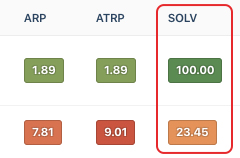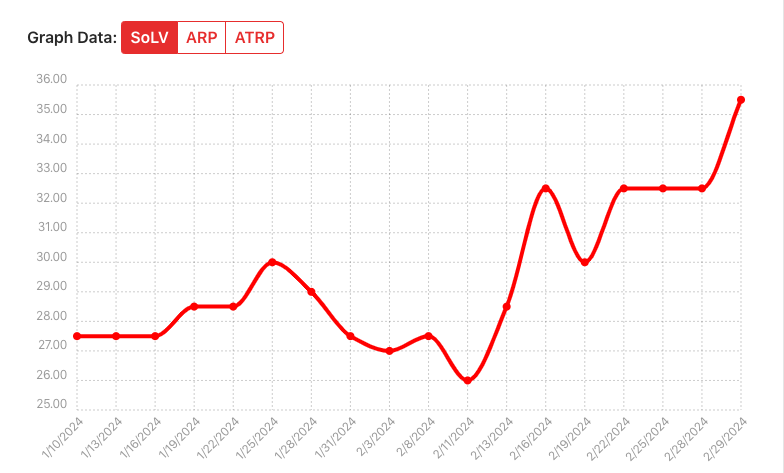SoLV® stands for Share of Local Voice. This shows how often a business ranks in the top three positions. Over time, SoLV® may be an excellent tool for understanding brand lift. SoLV® is a registered trademark of Local Falcon LLC.
In Local Falcon, your reports show SoLV® scores for both you and your competitors. The SoLV® score is a number that represents how often your business shows up in the top three positions on Google, known as the Google 3-Pack.
You can use your SoLV® score to help optimize your local search ranking by identifying opportunities to outrank competitors for specific keywords in specific areas, maximizing your local SEO efforts at a hyperlocal level.
Tracking your SoLV® score is also an excellent way to measure your performance and evaluate the success of your local SEO strategy and tactics over time.

Interpreting Your SoLV® Score
Your SoLV® score is always a number out of 100, with 100 representing the maximum number of times your business could appear in Google's 3-Pack for a scan.
For example, if you run a scan for the keyword "auto mechanic" in your local area and you get a SoLV® score of 23.45, this would mean that your business showed up 23.45% of the total possible number of times for that particular scan.
A SoLV® score of 0 means that your business doesn't appear in the 3-Pack at all for that scan, so you may want to try a new scan using a smaller Map Scan Radius and Grid Size or for a different keyword.
Using Your SoLV® Score To Identify Opportunities To Outrank Competitors
Ultimately, the higher your SoLV® score is, the better you're doing in local search, but the true strength of Share of Local Voice lies in its ability to help guide your local SEO strategy, particularly when it comes to identifying opportunities to outrank competitors and deciding where to focus your optimization efforts.
In order to use your SoLV® score to identify opportunities to outrank vulnerable competitors in local search results, you should run a few different scans for different keywords you want to target. Then, look at the SoLV® scores for your business and competitors to see where it might be worth focusing your local SEO efforts to improve your rankings.
For example, let's say you run scans for the keywords "plumber," "plumbing services near me," and "emergency plumbing repair."
Chances are, unless you're a large plumbing company that's already dominating the local market, you're going to see that there are a lot of competitors with a much higher SoLV® score than you for the keyword "plumber." This is because broad, general keywords like this have the highest competition — everyone wants to rank for them.
Earning a spot in Google's 3-Pack for such competitive keywords may not always be possible, especially when there are bigger, more established companies already ranking consistently in the top results for them.
However, it's much more possible to outrank competitors for more specific, longer-tailed keywords, such as "plumbing services near me" and "emergency plumbing services."
In this example scenario, you might see in the Scan Reports for these keywords that there are competitors above you in the rankings with SoLV® scores that are just one or two points higher than yours.
This tells you that if you focus on optimizing for these keywords, instead of ultra-competitive keywords like "plumbers," you have a real chance of jumping up in the rankings and appearing more often in the Google 3-Pack.
Improving your SoLV® by focusing your optimization efforts where you see there are achievable opportunities to outrank competitors can have a real impact on your business — the more you show up in the top three results on Google when people search for specific solutions nearby, the more local customers you're going to get.
Using Your SoLV® Score To Track and Measure Local SEO Performance
As you use your SoLV® score to guide your local SEO efforts, keep track of changes to your SoLV® score over time in order to measure your success and report back to stakeholders.
An easy way to do this in Local Falcon is to look at Trend Reports for the keywords you're optimizing for. Trend Reports aggregate data from all the scans you've run for a location and keyword using the same Scan Settings.
These reports highlight how your SoLV® score changes over time, presenting the data in a visual graph form, so you can see how optimizations (and potentially other market factors) affect it.
Not only that, but Trend Reports also include Falcon AI report analysis and recommendations, making it even easier to understand performance trends and evaluate what factors may be causing changes to your SoLV® score, such as recent optimizations you've made or new competitors entering the market.
Another great way to check your success using your SoLV® score is to look at Competitor Reports for the same keyword over a period of time. Competitor Reports show a list of all competitors found in a scan, including your business, ranked by their SoLV® scores.
By checking Competitor Reports as you work on optimizing for a particular keyword over time, you can see whether or not you're passing any of the vulnerable competitors you identified in the rankings for that keyword.

Understanding Other Uses of SoLV® Scores
In addition to your overall SoLV® score, SoLV® scores can be used in different ways to provide further insights.
Competition SoLV®
Competition SoLV® is the total number of competitors with any SoLV® score that is higher than 0.00, which tells you how many listings are actually competing. This can give you a good idea of how difficult it may be to compete in a given market for a keyword.
Max SoLV®
Max SoLV® is the highest SoLV® in the report, which tells you how high it may be possible for your SoLV® to go for a given market and keyword. This is also used to create an Opportunity SoLV® score.
Opportunity SoLV®
Opportunity SoLV® is the difference between your SoLV® and the Max SoLV® (the highest SoLV® in the report), which tells you how much growth you can potentially achieve with your optimization efforts for a given keyword and area.
Categories:Map Scan ToolReporting
Tags:reportingscan reportmetrics

